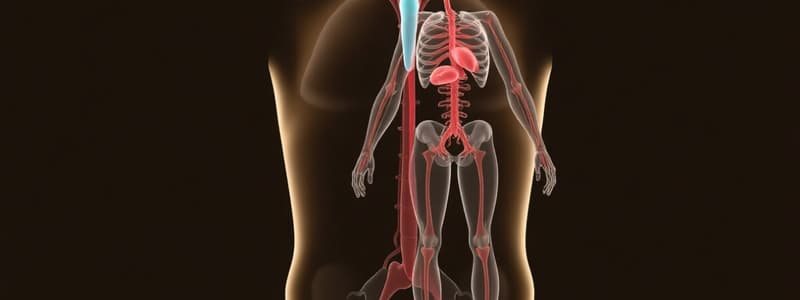Podcast
Questions and Answers
What defines human growth during development?
What defines human growth during development?
- The organized addition of new tissue from infancy to adulthood. (correct)
- The decrease in body size as children mature.
- The random addition of tissue throughout life.
- The uniform growth of all tissues simultaneously.
Which factor does NOT influence human growth according to the content?
Which factor does NOT influence human growth according to the content?
- Hormonal balance
- Environmental conditions
- Genetics
- Astrological signs (correct)
What is the term for the increase in cell number that contributes to growth?
What is the term for the increase in cell number that contributes to growth?
- Hypertrophy
- Allometric growth
- Proliferation
- Hyperplasia (correct)
During which phase does growth plate fusion typically occur?
During which phase does growth plate fusion typically occur?
What happens to the cartilage during bone elongation?
What happens to the cartilage during bone elongation?
What is the significance of allometric growth in humans?
What is the significance of allometric growth in humans?
Which of the following is a characteristic of enlarged tissues during growth?
Which of the following is a characteristic of enlarged tissues during growth?
Which of the following periods shows minimal growth according to the patterns discussed?
Which of the following periods shows minimal growth according to the patterns discussed?
What is the main function of chondrocytes in the context of bone growth?
What is the main function of chondrocytes in the context of bone growth?
What happens to epiphyseal cartilage as a long bone stops growing?
What happens to epiphyseal cartilage as a long bone stops growing?
Which hormone is primarily responsible for stimulating growth during childhood and puberty?
Which hormone is primarily responsible for stimulating growth during childhood and puberty?
What is the half-life of Growth Hormone (GH)?
What is the half-life of Growth Hormone (GH)?
What major change occurs in the secretion of Growth Hormone after age 4?
What major change occurs in the secretion of Growth Hormone after age 4?
How does ghrelin influence the release of Growth Hormone?
How does ghrelin influence the release of Growth Hormone?
What becomes visible on X-rays once the epiphyseal plate closes?
What becomes visible on X-rays once the epiphyseal plate closes?
What is a characteristic of the secretion pattern of Growth Hormone?
What is a characteristic of the secretion pattern of Growth Hormone?
Which factors primarily influence the secretion of Growth Hormone?
Which factors primarily influence the secretion of Growth Hormone?
At what age does the highest secretion of Growth Hormone typically occur?
At what age does the highest secretion of Growth Hormone typically occur?
What are growth hormone secretagogues (GHS)?
What are growth hormone secretagogues (GHS)?
Flashcards
Hypertrophy
Hypertrophy
The enlargement of chondrocytes within cartilage, leading to increased size of the cartilage tissue.
Calcification
Calcification
The process where minerals, like calcium and phosphate, deposit in the extracellular matrix of cartilage, making it harder and stronger.
Ossification
Ossification
The process by which osteoblasts replace calcified cartilage with bone tissue.
Epiphyseal Plate
Epiphyseal Plate
Signup and view all the flashcards
Epiphyseal Line
Epiphyseal Line
Signup and view all the flashcards
Growth Hormone (GH)
Growth Hormone (GH)
Signup and view all the flashcards
Pulsatile Secretion
Pulsatile Secretion
Signup and view all the flashcards
Ghrelin
Ghrelin
Signup and view all the flashcards
Growth Hormone Secretagogues (GHS)
Growth Hormone Secretagogues (GHS)
Signup and view all the flashcards
IP3 Pathway
IP3 Pathway
Signup and view all the flashcards
Human Growth
Human Growth
Signup and view all the flashcards
Growth Plate Fusion
Growth Plate Fusion
Signup and view all the flashcards
Hyperplasia
Hyperplasia
Signup and view all the flashcards
Allometric Growth
Allometric Growth
Signup and view all the flashcards
Factors Influencing Growth
Factors Influencing Growth
Signup and view all the flashcards
Chondrocyte Proliferation
Chondrocyte Proliferation
Signup and view all the flashcards
Cartilage Expansion
Cartilage Expansion
Signup and view all the flashcards
Growth Plate
Growth Plate
Signup and view all the flashcards
Diaphysis
Diaphysis
Signup and view all the flashcards
Study Notes
Human Growth & Endocrine System
- Human growth is the organized addition of new tissue, occurring from infancy to adulthood.
- Growth involves the lengthening of the skeleton (especially long bones and the spine) and the increasing size of soft tissues.
- The process begins at conception and completes during adolescence, when growth plates fuse.
Growth Mechanisms
- Growth is an increase in the size of a tissue or organism due to hypertrophy (increase in cell size) and hyperplasia (increase in cell number).
- The extracellular matrix around cells also increases in size.
Control of Growth
- Growth patterns are not linear, differing throughout development, like in neonates, infants, and puberty.
- Major factors influencing growth include genetics, adequate diet, and the absence of chronic diseases/stressful environments.
Allometric Growth
- Allometric growth describes differential growth of body parts.
- Body proportions change between infancy and adulthood, with a visible change in proportions as an individual ages from newborn to adult.
Growth Patterns Over Time
- A graph shows the relative growth of different body parts (head, lymphoid tissue, reproductive organs) as a percentage of total growth over time from birth to 15 years.
Structure of Long Bones
- Long bones are made up of spongy bone, medullary cavity, compact bone, diaphysis (shaft), epiphysis, metaphysis, and growth plates.
Bone Elongation and Calcification
- Chondrocytes rapidly divide in the proliferation zone increasing cartilage.
- New cartilage pushes older cartilage towards the diaphysis, lengthening the bone.
- Chondrocytes enlarge and the cartilage matrix calcifies.
- Osteoblasts invade and replace calcified cartilage with bone.
Epiphyseal Lines
- When long bones stop growing around ages 18-25, the epiphyseal cartilage disappears.
- The epiphyseal plate is visible in X-rays as epiphyseal lines.
- Bone can no longer lengthen once the growth plates fuse.
Growth Hormone (GH)
- GH is a 191 amino acid protein hormone.
- It has a half-life of 19 minutes and is secreted in pulses.
- Secretion is greatest in newborns and decreases at 4 years of age, then bursts during puberty after which it again decreases.
- Secreted by somatotrophs in larger quantities than other pituitary hormones.
Pulsatile Secretion of GH
- GH secretion fluctuates throughout the day.
- High levels during sleep and after strenuous exercise.
Pathway of GH Control
- GH release is regulated by a complex feedback loop.
- Stimuli, like GHRH and somatostatin, from the hypothalamus regulate the anterior pituitary. The pituitary then regulates GH levels.
- GH stimulates the liver to produce IGF-1. IGF-1 then further regulates GH secretion.
Factors Affecting GH
- Various factors like glucose, free fatty acids, and hormones like glucocorticoids affect GH secretion.
- Ghrelin, a peptide hormone, is shown to stimulate GH release.
- Various molecules called growth hormone secretagogues (GHS) also stimulate GH release.
Actions of Ghrelin
- Ghrelin stimulates appetite, gastric motility, and acid secretion.
- Affects reproductive function, glucose and lipid metabolism, and cardiovascular function.
- Has anti-inflammatory effects, and stimulates bone formation and cell proliferation.
Studying That Suits You
Use AI to generate personalized quizzes and flashcards to suit your learning preferences.




